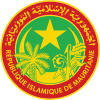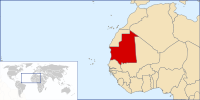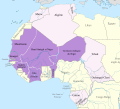The Mauritania Portal - بوابة موريتانيا
Mauritania, formally the Islamic Republic of Mauritania, is a sovereign country in Northwest Africa. It is bordered by the Atlantic Ocean to the west, Western Sahara to the north and northwest, Algeria to the northeast, Mali to the east and southeast, and Senegal to the southwest. By land area Mauritania is the 11th-largest country in Africa and 28th-largest in the world; 90% of its territory is in the Sahara. Most of its population of some 4.3 million lives in the temperate south of the country, with roughly a third concentrated in the capital and largest city, Nouakchott, on the Atlantic coast. The country's name derives from Mauretania, the Latin name for a region in the ancient Maghreb. It extended from central present-day Algeria to the Atlantic. Berbers occupied what is now Mauritania by beginning of the third century AD. Groups of Arab tribes migrated to this area in the late seventh century, bringing with them Islam, Arab culture, and the Arabic language. In the early 20th century, Mauritania was colonized by France as part of French West Africa. It achieved independence in 1960, but has since experienced recurrent coups and periods of military dictatorship. The 2008 Mauritanian coup d'état was led by General Mohamed Ould Abdel Aziz, who won subsequent presidential elections in 2009 and 2014. He was succeeded by General Mohamed Ould Ghazouani following the 2019 elections, head of an autocratic government with a very poor human rights record, particularly because of its perpetuation of slavery; the 2018 Global Slavery Index estimates there are about 90,000 slaves in the country (or 2.1% of the population).. Despite an abundance of natural resources, including iron ore and petroleum, Mauritania remains poor; its economy is based primarily on agriculture, livestock, and fishing. Mauritania is culturally and politically part of the Arab world; it is a member of the Arab League and Arabic is the official language. The official religion is Islam, and almost all inhabitants are Sunni Muslims. Despite its prevailing Arab identity, Mauritanian society is multiethnic; the Bidhan, or so-called "white moors", make up 30% of the population, while the Haratin, or so-called "black moors", comprise 40%. Both groups reflect a fusion of Arab-Berber ethnicity, language, and culture. The remaining 30% of the population comprises various sub-Saharan ethnic groups. (Full article...) Selected article -Adrar (Arabic: ولاية أدرار, romanized: Wilāyat Adrār) is a large administrative region in Mauritania, named for the Adrar Plateau. The capital is Atar. Other major towns include Choum, Chinguetti and Ouadane. The region borders Western Sahara and the Mauritanian region of Tiris Zemmour to the north, Mali and the Mauritanian region of Hodh Ech Chargui to the east, the Mauritanian regions of Trarza and Tagant to the south and the Mauritanian region of Inchiri to the west. As of 2013, the population of the region was 62,658, compared to 77,812 in 2011. There were 49.19 per cent females and 50.81 per cent males. As of 2008, the literacy rate for people aged 15 years and over was 50.30%. The total net enrolment ratio at secondary level was 7.10%. As of 2008, the activity rate was 48.20% and economic dependency ratio was 0.84. (Full article...) This is a Good article, an article that meets a core set of high editorial standards.
Mauritania competed at the 2012 Summer Olympics in London, which was held from 27 July to 12 August 2012. The country's participation at London marked its eighth appearance in the Summer Olympics since its debut in the 1984 Summer Olympics. The delegation included two track and field athletes, Jidou El Moctar and Aicha Fall, who were selected to the team by wildcard places, as the nation had no athletes that met either the "A" or "B" qualifying standards. Moctar was selected as flag bearer for the opening ceremony while a LOCOG Games Maker carried it for the closing ceremony. Neither of the two athletes progressed beyond the heats. (Full article...) CategoriesGeneral images -The following are images from various Mauritania-related articles on Wikipedia.
Related portalsWikiProjects
Topics in MauritaniaCities and towns
CommunesAssociated WikimediaThe following Wikimedia Foundation sister projects provide more on this subject:
Discover Wikipedia using portals | ||||||||||||||||||||||||||||||||||||||||||||||||||||||||||||||||












































